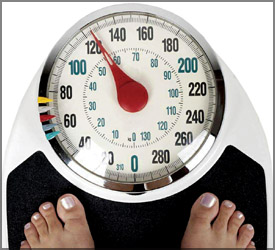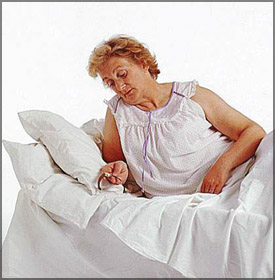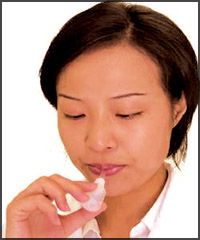|
Health watch
|
Compiled and coordinated by Edward
Arambewala |
Surprising facts about Weight gain
Dr. Kelum Pelpola
Plenty has been talked throughout the years about weight gain and how
to counter it. It’s no mystery that a diet full of fried food, giant
portions, scrumptious sweet desserts, alcohol, and sugary soft drinks
will lead to weight gain.

And there’s little question why the pounds pile up when you take in
more calories than you burn in physical activity. But how do you explain
weight gain when your lifestyle includes regular exercise and a healthy
diet that is controlled in calories? Gaining weight is absolutely
maddening, especially when you really don’t understand why the needle on
the scale keeps going up.
Several things should be considered if you are gaining weight while
watching calories and being physically active. More than likely, it’s a
variety of things working together that have resulted in the weight gain
rather than a single factor.
Here are five factors that can cause the weight gain when you least
expect it.
The body functions best when well rested. When you don’t get enough
sleep, your body experiences physiological stress and, biochemically,
you store fat more efficiently.
When you’re tired, you also don’t handle stress as well, so you may
reach for food as a coping mechanism.
Further, you may be taking in extra calories from late-night
snacking. Some people think eating might help them get back to sleep,
but all it really does is add more calories to their daily total.
Symptoms that you may not be getting enough rest include fatigue, low
energy levels, nodding off easily, and feeling irritable.
Strive to get seven to eight hours of sleep each night. Recent
studies have found that if you sleep either more or less than this ideal
amount, your productivity throughout the day as well as other health
benefits of sleep would diminish. When you develop good sleeping rituals
and get regular exercise, you sleep better.
Gone are the days of our fore fathers who had a relatively calm and
peaceful lifestyle. We now live in a society that demands we do more, be
more, and achieve more.
Almost everybody in our society have some kind of stress in their
day- to-day work. Although a certain level of stress moves us forward
and helps cope with life’s demands, in the long run, continuous levels
of stress affects our mood and emotions in a negative way.
Stress response, whether it is ‘fight-or-flight,’ juggling too many
responsibilities, or coping with financial pressures, triggers a
biochemical process where our bodies go into survival mode. Our bodies
store fuel, slow down metabolism, and dump out chemicals [cortisol,
leptin and other hormones] which are more likely to cause obesity in the
abdominal region.
Many people reach for food to help ease the stress. But, of course,
this doesn’t work in the long run.
Food is a temporary fix because it does not deal with the real
stressors that must be addressed in order to reduce the trigger for
eating and fix the problem.
Stress eaters tend to prefer high-carbohydrate foods because these
foods trigger an increase in the brain chemical serotonin, which has a
calming effect. It is almost like self-medicating. Many people binge on
starchy foods to make themselves feel better.
The next time you are stressed, take special efforts to curb you
appetite and try to practice a relaxation technique as well as engage in
exercise, which also burns calories and provides other health benefits.
Some prescription drugs used to treat depression, mood disorders,
seizures, migraines, blood pressure, and diabetes can cause weight gain,
from a modest amount to as much as 4-5 kilogrammes per month.
Some steroids, hormone replacement therapy, and even oral
contraceptives may also cause gradual weight creep. Your medicine
cabinet might be the cause of your weight gain if you’ve gained 5 or
more pounds in a month without a change in your lifestyle.
 Every
drug works a little differently to cause weight gain, from increasing
appetite, altering the way fat is stored, to how insulin levels change.
It should also be remembered that, not all drugs have the same side
effects on all people. Every
drug works a little differently to cause weight gain, from increasing
appetite, altering the way fat is stored, to how insulin levels change.
It should also be remembered that, not all drugs have the same side
effects on all people.
In the case of antidepressants, weight gain may not even be related
to the action of the drug - feeling better can also result in a heartier
appetite.
Some drugs can cause fluid retention that shows up on the scale as
weight gain, but is not fat, and is usually easily corrected.
Experts say that some of the most common types of medications that
may cause weight gain are:
Steroids
Antidepressants
Antipsychotics
Antiseizure medications
Diabetes medications
High blood pressure medications
Heartburn medications
It’s important to remember that a few extra pounds may be well worth
the trade-off of what a particular medication does for your overall
health, experts say. Further, even if your medications are the cause of
your weight gain, you still need to be mindful of eating a healthy diet
and getting regular exercise. Although medications can contribute, they
rarely are the sole cause of the weight gain.
If you suspect your medication is causing weight gain, talk to your
doctor to see about changing your prescription. But whatever you do,
don’t go off your medication without seeking medical advice. There could
be very serious consequences if you stop taking your medication without
consulting your physician.
The most common medical condition that causes weight gain is
hypothyroidism. A deficiency of thyroid hormone can decrease metabolism,
causing appetite loss and weight gain.
If you are feeling fatigued, lethargic, swelling, hoarse voice,
intolerance to cold, sleeping too much, or headaches, you should see
your doctor for an easy test to determine if you have hypothyroidism.
Much rarer is a condition known as Cushing’s syndrome - a disorder
caused by an excess of the hormone cortisol - that can also result in
weight gain.
Women reach menopause at a range of ages, but most are in midlife and
are often less physically active than when they were younger. Along with
aging comes a natural slowing of metabolism.
At the same time, hormonal changes can trigger hunger, depression,
and poor sleep.
It is multifactoral. When women go through menopause, they lose
oestrogen, causing their shapes to change — usually a loss of hip and
thigh weight. And they start to gain more in the middle. Oestrogen
favours fat deposition in the lower body, and when you lose this
hormone, fat is more likely to be deposited in the midsection (much like
men).
The key to avoiding this extra belly fat is to maintain and increase
the amount of lean body mass, which will, in turn, increase your
metabolism or calorie burn rate.
Women need to understand how critically important weight lifting and
strength training is to their health. And don’t worry, doing strength
training won’t make women muscle-bound, experts say.
Exercise also helps offset bone loss that can come with menopause. A
combination of exercise and a healthy, calorie-controlled diet rich in
calcium and vitamin D is the answer to thwarting menopausal weight gain.
So, it is very important to keep an eye on these factors all the
time, if you have a problem of weight gain. You may have been doing all
the other right things but then, these factors may have gone unnoticed
for years.
UK medical mission here in October for free plastic surgery on
children
A plastic surgery team from UK is expected in Colombo by the end of
October on a social service medical mission to carry out a series of
cleft lip plastic surgery operations on poor children affected with this
problem in the Embilipitiya area.
This annual health programme for the poor children affected with this
problem in the Embilipitiya area.
This annual health programme for the poor children affected with this
condition is being organised by the German Help Foundation NGO in Sri
Lanka from 1995 in association with medical teams from UK and Germany.
The Foundation’s Secretary Francis Vedanayagam in an interview with
the Healthwatch said from 1995 up to now 2800 poor children in the
country affected with this conduction had been operated under this
programme by foreign medical missions.
The Embilipitiya programme is being done in association with the
Lions Club of Embilipitiya, in the Embilipitiya Hospital.
Children to be operated are to be selected by that Lions Club.
Vedanayagam said the medical team was planning to come in May but
owing to the problems in the country it has been put off for October.
The President of the Foundation former Lions District Governor Fousal
Khalid said that these operations if done in the private sector cost
about Rs. 1.5 to 2 million each which no poor affected child could
afford.
On account of this, these medical teams have to be credited and
honoured for this meritorious service they are doing, because they bring
with them all the drugs and other necessities for the operations thus
there is no cost to the country at all.
In addition, the medical team trains our doctors in the hospital in
the operation procedures in correcting the defect.
Tuberous Sclerosis (TS) Patients Association
Kumari Martenstyne of Commercial Bank has written to us requesting
help to form a TS Patients Association.
She writes:
My son is suffering with a very rare genetic disorder called
“Tuberous Sclerosis (TS)”. TS is a genetic condition commonly
characterised by seizures and tumor growth in vital organs such as
brain, kidneys, heart, lungs and skin with no cure and no predictable
future.
My son used to get various forms of seizures till recent past. Now he
gets one particular seizures almost daily, a couple of times.
Since we do not have TS specialists in Sri Lanka, I found it very
difficult to handle his sickness with unknown and strange side effects.
Sometimes I really got confused and panicked and assume I made a few
mistakes due to lack of knowledge. I searched websites and read a lot of
books to enhance my knowledge about the sickness but still I struggle a
lot with his uncontrolled seizures.
I am a banker (Commercial Bank of Ceylon Ltd). Is it possible for me
to put an article to gather the takecarers of these patients and form an
association which might be very helpful to them. I really want them to
know about the TS and how to tackle the situations for the benefit of
the patients. In western countries, they have formed associations and do
a wonderful job for the patients.
Cake may be the answer to kids’ egg allergy
  To
desensitise young children to their allergy to eggs, physicians from
Greece say “let them eat cake.” To
desensitise young children to their allergy to eggs, physicians from
Greece say “let them eat cake.”
Heat modifies certain egg allergens and, in turn, allows some
children with egg allergies to be “treated” by feeding them ever
increasing amounts of egg baked in a cake, Dr. George N. Konstantinou
and colleagues, at the University of Athens report.
They used this approach to accelerate the development of tolerance to
hen’s eggs among 94 boys and girls referred to the food allergy
department at the university.
After undergoing six months of desensitization, 90 percent of the
children could tolerate egg baked in a cake, the researchers report in a
preliminary, online posting by the Journal of Allergy and Clinical
Immunology.
“Parents should be aware that there are novel approaches for handling
egg allergy,” said study co-investigator Dr. Nikolaos G. Papadopoulos.
But he cautions not to try this at home. “Children with a known food
allergen should be treated under the supervision of a specialized
physician,” Papadopoulos told Reuters Health.
REUTERS

Compound in human saliva can speed wound healing:
Dutch researchers
Researchers from The Netherlands have identified a compound in human
saliva that greatly speeds wound healing, according to their report
published in The Journal of Federation of American Societies for
Experimental Biology (FASEB).
The research team found that histatin, a small protein in saliva
previously only believed to kill bacteria was responsible for wound
healing.
This research may offer hope to people suffering from chronic wounds
related to diabetes and other disorders, as well as traumatic injuries
and burns. In addition, because the compounds can be mass produced, they
have the potential to become as common as antibiotic creams and rubbing
alcohol.
“We hope our finding is ultimately beneficial for people who suffer
from non-healing wounds, such as foot ulcers and diabetic ulcers, as
well as for treatment of trauma-induced wounds like burns,” said Menno
Oudhoff, first author of the report.
“This study not only answers the biological question of why animals
lick their wounds,” said Gerald Weissmann, editor-in-chief of The FASEB
Journal, “it also explains why wounds in the mouth, like those of a
tooth extraction, heal much faster than comparable wounds of the skin
and bone. It also directs us to begin looking at saliva as a source for
new drugs.”
Xinhua |

